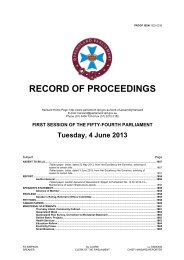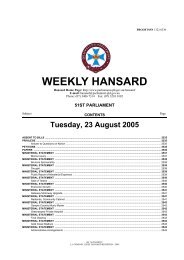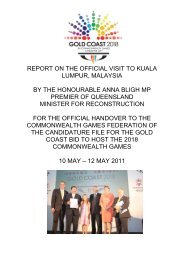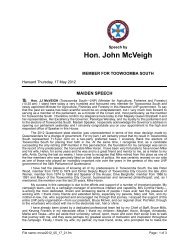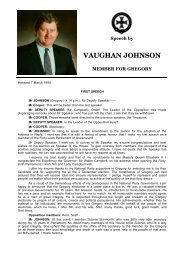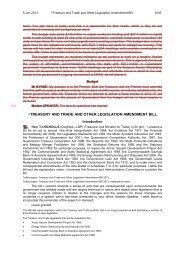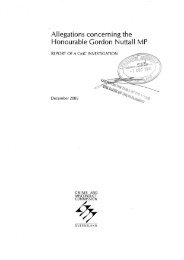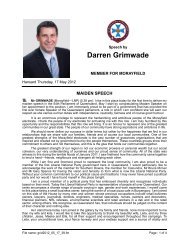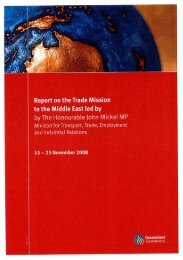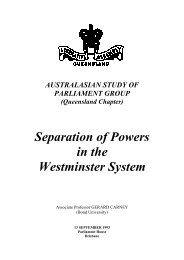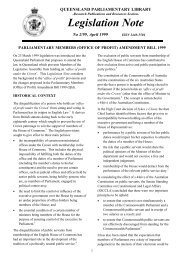Full transcript - Final - Queensland Parliament - Queensland ...
Full transcript - Final - Queensland Parliament - Queensland ...
Full transcript - Final - Queensland Parliament - Queensland ...
You also want an ePaper? Increase the reach of your titles
YUMPU automatically turns print PDFs into web optimized ePapers that Google loves.
9 Mar 1999 Community-Based Referendum Bill 309<br />
The community should have a set of reins<br />
to guide Government back onto the track if it<br />
should deviate too far from the purpose for<br />
which it was elected, particularly if that<br />
deviation was caused by minority pressure<br />
groups or non-elected powerbrokers who may<br />
desire to bring unreasonable or self-serving<br />
pressure to bear on members of <strong>Parliament</strong>, or<br />
who may attempt by various means to<br />
manipulate <strong>Parliament</strong>. The provisions of the<br />
Bill reflect the desire of the community to have<br />
a greater input into the decisions that affect<br />
the community than is presently available.<br />
Other important provisions ensure that the<br />
processes are accessible to the community. At<br />
first the criteria of 2% of electoral enrolment<br />
would seem low. However, this does mirror<br />
Liberal and Democrat policy.<br />
Honourable members interjected.<br />
Mr SPEAKER: Order! There is too much<br />
audible conversation in the Chamber.<br />
Mr FELDMAN: Mr Speaker, I will accede<br />
to the wishes of the House. I ask that the<br />
remainder of my speech be incorporated in<br />
Hansard.<br />
Leave granted.<br />
This Bill provides the added safeguard of<br />
ensuring that the support must reflect the<br />
wishes of electors spread throughout the state.<br />
A minimum of 2% of electors on the electoral<br />
roll in a majority of electoral districts is an<br />
essential to demonstrate a geographical spread.<br />
This ensures that only proposals with<br />
widespread community support throughout the<br />
State could qualify. Further, it ensures crosssection<br />
support, ensuring that the proposal is a<br />
genuine issue. It avoids "city versus country"<br />
arguments, and it should be mentioned that the<br />
required support to trigger a referendum is<br />
among the highest in the world.<br />
This Bill has been developed over a period of<br />
many years specifically for Australian<br />
<strong>Parliament</strong>s and it combines the best features of<br />
all the direct democracy systems in the world.<br />
The process is not at all new to this State. We<br />
had local option polls under the Liquor Acts, in<br />
which the people of the area were able, on<br />
consideration of all the issues, to determine<br />
what kind of environment they wished for their<br />
community. For example, the people of<br />
Buderim twice rejected a hotel, but welcomed<br />
the tavern which is still there and doing well.<br />
They were concerned justifiably also with<br />
reducing the death toll and accidents given the<br />
state of the roads up and down the mountain.<br />
The community was the clear winner through<br />
this very same kind of process.<br />
We also had similar provisions in the Local<br />
Government Act for complete enfranchisement<br />
of the electors by direct democracy from 1920.<br />
It is now time to restore that direct democracy<br />
back to the electors so that they can fully<br />
participate in the promotion of what they<br />
consider to be in the best interests of the whole<br />
of their community.<br />
The cost of a referendum held at the same time<br />
as a State election or a State referendum poll is<br />
minimal. The provision of 5% of electors is a<br />
"safety valve" which would enable the holding<br />
of a poll at an earlier time, if the concern were<br />
not sooner addressed by the <strong>Parliament</strong>.<br />
Approval requires the vote of a majority of<br />
electors of the State voting in favour of the<br />
legislative proposal, which will have already<br />
been thoroughly scrutinised by the Scrutiny of<br />
Legislation Committee, and subjected to any<br />
appropriate amendments. In addition, a majority<br />
of electors voting on the proposal in a majority<br />
of electoral districts is necessary for approval.<br />
Proposed legislation can become law only with<br />
the assent of the Governor, which presently<br />
depends on the advice of the Premier to assent<br />
to any Bill, and the passage of this Bill would<br />
not change that situation. If, however, the<br />
electors approved at referendum an amendment<br />
to the Constitution to require the Premier to<br />
recommend the giving of assent, that would be<br />
a different matter.<br />
The Bill will enable the community to address<br />
matters it considers important. Notwithstanding<br />
that the clear vote of the community is not<br />
formally binding on the Premier to advise<br />
assent, It would be a brave Government indeed<br />
to ignore a successful referendum.<br />
A local community referendum poll in New<br />
South Wales saw a council reposition a waste<br />
disposal facility which would have had the<br />
potential to contaminate the Darling and Murray<br />
Rivers with carcinogens all the way to the<br />
Adelaide water supply. The local votes were so<br />
decisive that the council repositioned the<br />
facility to a suitable location. The people were<br />
concerned not for themselves but for their<br />
fellow human beings, and this vote persuaded<br />
the council to do the right thing in repositioning<br />
the facility. This is a simple illustration of how<br />
minimum expenditure avoided irreversible harm,<br />
including the very real possibility of birth<br />
defects. It only happened because the people<br />
were able to exercise their "free and direct<br />
expression" on this matter that had been<br />
concerning them for years. Democracy saved<br />
the day, and in this instance the poll was held<br />
informally with the State election and did not<br />
cost the Government a cent!<br />
The proposal contained in this Bill has strong<br />
support of well-known Australians. These<br />
include Bryce Courtenay, Thomas Kenneally,<br />
Morris West, Colleen McCullough, Reg Murray,<br />
Kate Carnell, Cheryl Kernot, Peter Reith, and<br />
former Senators, Colin Mason and Michael<br />
Macklin. Russell Cooper declared his<br />
unequivocal support for the proposal, and is<br />
sure to honour his word. Ted Mack enjoyed the<br />
positive support of Frank Walker, former



